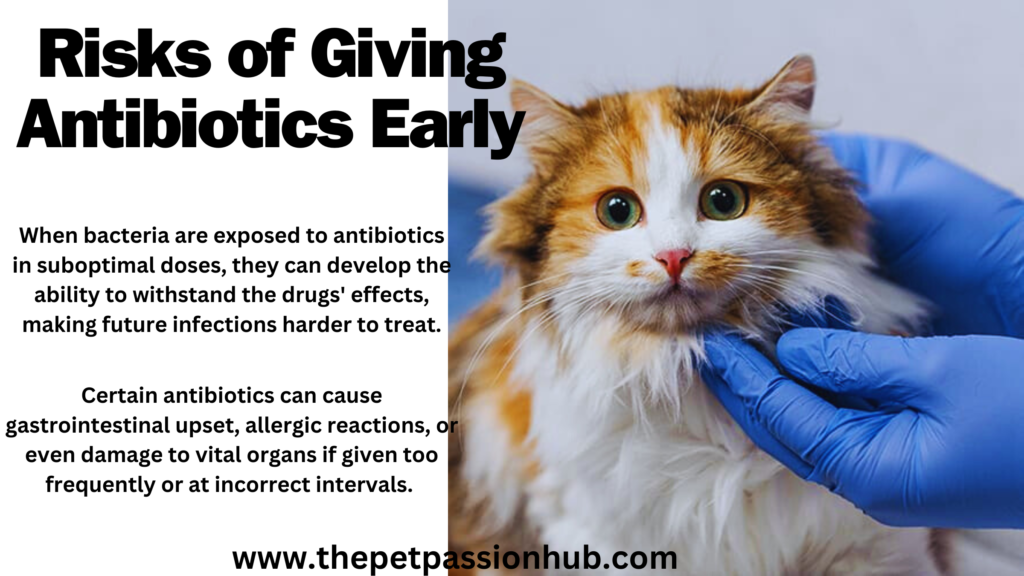Introduction
Caring for a furry feline friend comes with its own set of challenges, especially when it comes to administering medication.
If you’ve ever found yourself wondering, Can I give my cat his antibiotic 2 hours early? then this ultimate guide is for you.
As a responsible pet owner, it’s crucial to understand the ins and outs of a cat’s antibiotic schedule in order to ensure their health and well-being.
Whether your feline companion goes by the name of Feline or Fluffy. Getting the timing right for their medication can be a puzzling task.
In this comprehensive article, we’ll delve into the dos and don’ts of adjusting your cat’s antibiotic schedule. And provide expert insights on how to navigate this common pet care dilemma.
Understanding Cat Antibiotics
Understanding cat antibiotics is crucial for ensuring the health and well-being of your feline companion.
When it comes to administering these medications, sticking to a consistent schedule is key.
However, if you find yourself in a situation where you need to adjust the dosage time for your cat’s antibiotics. It’s important to understand the potential implications.
Changing the timing of your cat’s antibiotic dose by a couple of hours may seem inconsequential. But it can actually affect the effectiveness of the medication.
This is because antibiotics work best when administered at evenly spaced intervals. Allowing for consistent levels of the drug in your cat’s system.
Deviating from the prescribed schedule could lead to suboptimal treatment outcomes and even contribute to antibiotic resistance in your pet.
Ultimately, consulting with your veterinarian before making any adjustments to your cat’s antibiotic schedule is highly recommended.
They can provide tailored guidance based on your cat’s specific condition. And ensure that any changes made are safe and effective.
By prioritizing open communication with your vet, you can better navigate any uncertainties surrounding feline antibiotic administration. And ensure that your beloved pet receives the best possible care.
Importance of Timely Administration
Timing is crucial when it comes to administering antibiotics to your cat. Altering feline antibiotic timing, even by just a couple of hours, can have a significant impact on the effectiveness of the treatment.
Antibiotics work best when they are given at consistent intervals, as this helps maintain a steady level of the medication in your cat’s system.
Inconsistent administration could lead to suboptimal antibiotic levels in the body, potentially resulting in treatment failure or the development of antibiotic-resistant bacteria.
Furthermore, timely administration also plays a role in minimizing potential side effects for your feline friend.
Some antibiotics need to be taken with food to prevent stomach upset, while others require an empty stomach for optimal absorption.
Thus, sticking to the prescribed schedule ensures that your cat receives their medication under conditions that maximize its therapeutic benefit while reducing any adverse reactions.
Ultimately, proper timing is not just about following instructions – it directly impacts the well-being and recovery of your beloved pet.
Why Your Cat’s Huffing and Puffing? The Surprising Reasons
Risks of Giving Antibiotics Early

Taking antibiotics too early or skipping doses can lead to antibiotic resistance, a serious public health concern.
When bacteria are exposed to antibiotics in suboptimal doses, they can develop the ability to withstand the drugs’ effects, making future infections harder to treat.
Additionally, giving antibiotics early without completing the full course may not completely eradicate the infection, leading to a recurrence of illness that is now resistant to treatment.
Another risk of giving antibiotics early is the potential for adverse reactions or side effects in your cat. Certain antibiotics can cause gastrointestinal upset, allergic reactions, or even damage to vital organs if given too frequently or at incorrect intervals.
It’s important to adhere strictly to your veterinarian’s prescribed dosing schedule and not make adjustments without consulting them first.
Ultimately, by following proper dosing guidelines and completing the full course of antibiotics as directed by your vet, you can help ensure the best outcome for your cat’s health while minimizing risks associated with premature antibiotic administration.
Can I Give My Cat His Antibiotic 2 Hours Early?
Factors to Consider
When considering whether to give your cat its antibiotic two hours early, several factors must be taken into account.
Several factors can influence whether giving a cat an antibiotic 2 hours early is appropriate:
- Type of Antibiotic: Different antibiotics have different dosing requirements and half-lives.
- Severity of Infection: The seriousness of the infection may impact the need for strict adherence to the dosing schedule.
- Cat’s Health Status: The overall health of the cat, including kidney and liver function, can affect medication metabolism.
The type of antibiotic prescribed is crucial, as some medications require strict adherence to the dosing schedule for optimal effectiveness.
Additionally, the severity of your cat’s condition plays a significant role—while some illnesses may tolerate a slight deviation in timing, others may warrant strict adherence to the prescribed schedule.
Furthermore, it’s essential to consider any potential side effects or interactions with other medications when contemplating an early dose.
Your veterinarian can provide valuable insight into the specific medication and its impact on your cat’s health.
Lastly, understanding your cat’s individual response to the antibiotic and consulting with a professional can help guide your decision-making process and ensure the best possible care for your feline companion.
Consulting Your Vet

When it comes to giving your cat medication, consulting your vet is crucial. Even small changes in dosage timing can have significant effects on the treatment’s effectiveness and your cat’s well-being.
Your vet understands your cat’s specific health needs and can provide tailored advice based on their medical history and current condition.
Additionally, seeking guidance from a professional demonstrates responsible pet ownership. It shows that you value your feline friend’s health and are committed to ensuring they receive the best care possible.
Ultimately, trusting your vet’s expertise will help you make informed decisions about administering medication to your cat, leading to better outcomes for their recovery and overall health.
Can I Give My Cat his Antibiotic 2 Hours Early? For instance, if the veterinarian instructed you to give your cat an antibiotic at 10 am and then again at 6 pm, it’s generally best to stick to this schedule.
However, if a specific situation arises, such as your cat being unusually distressed or experiencing adverse effects from the medication. It is advisable to consult with the vet before administering the antibiotic early.
Conclusion: Best Practices for Medicating Your Cat
In conclusion, medicating your cat requires patience, consistency, and a gentle approach.
Always follow the prescribed dosage and schedule provided by your veterinarian to ensure the effectiveness of the medication.
It’s important to handle your cat with care during the process, incorporating positive reinforcement and rewards to create a positive association with taking medication.
Additionally, closely monitor your cat for any adverse reactions or changes in behavior while on medication.
Be sure to communicate regularly with your vet about any concerns or challenges you encounter so that adjustments can be made if necessary.
Remember that every cat is unique, so finding the best approach may require some trial and error – but with diligence and love, you can help your feline companion stay healthy and happy.
FAQs
Q: Can I give my cat his antibiotic 2 hours early?
A: It’s best to stick to the prescribed dosing schedule for your cat’s antibiotic to ensure effectiveness and minimize the risk of side effects.
Q: What should I do if I miss a dose of my cat’s antibiotic?
A: Contact your veterinarian for guidance on how to proceed if you miss a dose of your cat’s antibiotic.
Q: Can I crush my cat’s antibiotic pill and mix it with food?
A: Always consult your veterinarian before altering the form or administration of your cat’s medication.
Q: How long should I continue giving my cat his antibiotic?
A: Follow your veterinarian’s instructions regarding the duration of antibiotic treatment for your cat.
Q: Are there any common side effects of antibiotics in cats?
A: Possible side effects of antibiotics in cats may include vomiting, diarrhea, or allergic reactions. Contact your vet if you notice any adverse effects.
Q: Can I stop giving my cat his antibiotic once he starts feeling better?
A: It’s important to complete the full course of antibiotics as prescribed by your veterinarian, even if your cat appears to be improving.
Q: Should I be concerned about interactions between my cat’s antibiotic and other medications?
A: Inform your vet of any other medications or supplements your cat is taking to ensure there are no potential interactions with the prescribed antibiotic.
Q: What should I do if my cat experiences an adverse reaction to his antibiotic?
A: If you suspect that your cat is having an adverse reaction to the antibiotic, contact your veterinarian immediately for further guidance.
